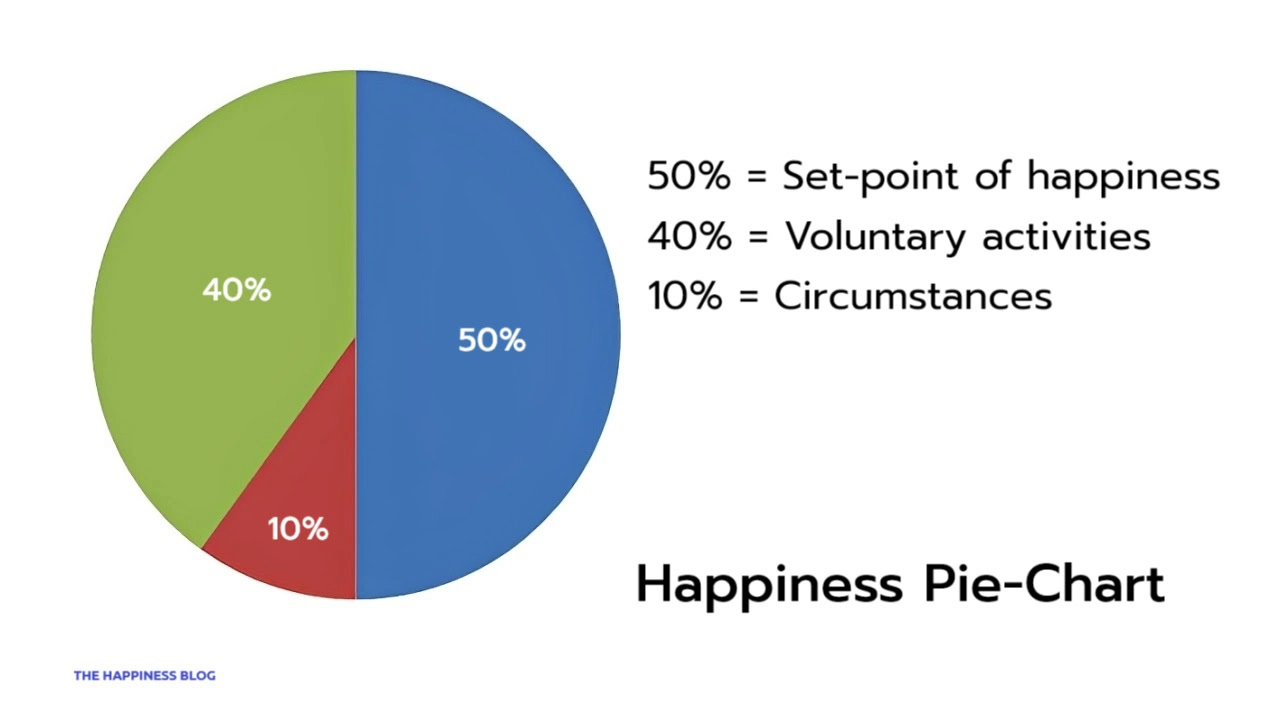Today's Sunday • 7 mins read
Every November, we gather around tables, pass dishes, and take turns sharing what we’re grateful for. It’s a tradition.
But what if I told you that the simple act behind Thanksgiving—expressing gratitude—can measurably change your life?
Robert Emmons, a psychology professor at UC Davis and the world’s leading researcher on gratitude, spent over a decade studying this question. He found many striking things about gratitude.
For one, people who regularly practice grateful thinking can boost their happiness by 25%. That’s not a minor uptick. That’s a quarter of your potential joy sitting on the table, waiting for you to claim it.
The Research That Changed Everything
Emmons conducted a series of studies that completely upended the world of happiness research (Emmons & McCullough, 2003).
In one experiment, he divided participants into three groups over 10 weeks. The first group wrote down five things they were grateful for each week. The second group listed five daily hassles. The third group simply noted five events that occurred, with no emotional direction.
- (Group 1) Gratitude condition: five things they were grateful for
- (Group 2) Hassles condition: five things they were displeased about
- (Group 3) Events condition: five neutral events
The results: The gratitude group felt 25% happier than the others.
“Participants in the gratitude condition felt better about their lives as a whole and were more optimistic about the future than participants in either of the other control conditions. To put it into numbers, according to the scale we used to calculate well-being, they were a full 25 percent happier than other participants.” — Thanks! How the New Science of Gratitude Can Make You Happier,” book by Robert Emmons.
They were more optimistic about their futures, felt better about their lives overall, and here’s the kicker: they exercised nearly 1.5 hours more per week than those focused on hassles or neutral events.
Just from writing down what they appreciated once a week.

Three Weeks to Better Sleep
Emmons didn’t stop with college students. He wanted to know if gratitude could help people facing real, chronic difficulties.
So he studied adults with neuromuscular disorders, that is, people dealing with joint pain, muscle atrophy, and serious physical limitations.
After a 21-day gratitude practice, these participants reported better sleep quality and duration compared to the control group. They also felt more satisfied with their lives and more optimistic about the upcoming week.
Sleep, as Emmons noted, is a strong indicator of overall well-being. When you sleep well, nearly everything else improves.
“Compared to those who were not jotting down their blessings nightly, participants in the gratitude condition reported getting more hours of sleep each night, spending less time awake before falling asleep, and feeling more refreshed upon awakening.” — Thanks! How the New Science of Gratitude Can Make You Happier,” book by Robert Emmons.
Three weeks. That’s all it took to see measurable changes in people living with chronic pain.

“Gratitude is an acknowledgment that we have received something of value from others. It arises from a posture of openness to others, where we are able to gladly recognize their benevolence.” — Emmons & Mishra, 2010
Why Gratitude Works When It Shouldn’t
Here’s what makes this research fascinating: gratitude should, theoretically, have some downsides.
When you focus on what others have given you, you’re reminded of your dependence on them. You might feel indebted. And studies show people don’t enjoy feeling like they owe others.
Yet, gratitude increases happiness anyway.
Emmons was surprised by his own findings. The brain, it turns out, can’t hold negative and positive emotions simultaneously.
When you’re genuinely grateful, there’s no room for resentment, greed, or bitterness. Gratitude crowds out the toxic stuff.
The practice also shifts your perspective. You stop taking things for granted. That sunset through the clouds becomes a gift.
The fact that you woke up pain-free becomes worth noting. Life starts looking different when you train yourself to spot what’s working instead of what’s broken.
The Set Point Myth
For years, researchers believed we all have a “set point” for happiness: a baseline determined at birth that we always return to, no matter what happens.
Win the lottery? You’ll be happier for a while, then drift back to your set point. Lose your job? Same thing in reverse.
Emmons’ research challenged this idea.
The 25% happiness increase from gratitude practice didn’t fade after a few days. It lasted for months.
People were resetting their happiness baselines simply by paying attention to what they appreciated.
Your happiness level isn’t fixed. You’re not stuck at whatever emotional temperature you were born with. Gratitude gives you a dial you can actually turn.
Beyond Happiness: The Physical Benefits
Gratitude doesn’t just make you feel good emotionally. Emmons found that grateful people report:
- Stronger immune systems
- Fewer aches and pains
- Lower blood pressure
- More exercise and better self-care habits
- Longer, more restful sleep
They also experience higher levels of positive emotions—joy, enthusiasm, love, optimism—and feel more connected to others. Grateful people, as it turns out, are more pleasant to be around. Their family and friends notice the difference.
This matters because happiness isn’t just an internal experience. It ripples outward. When you’re genuinely grateful, you’re more likely to help others, to be generous, to show up as your best self in relationships.
How to Practice Gratitude (Without It Feeling Forced)
Emmons recommends starting simple. Keep a gratitude journal, but you only need to list five things once a week. That’s it.
You’re not writing essays about your feelings. You’re just noting what went well, what you appreciated, what made you stop and think, “that was nice.”
You can also practice counting your blessings at a set time each day—first thing in the morning or right before bed. What are you grateful for today? You don’t have to write it down. Just think about it.
If you have kids, use concrete reminders. A gratitude jar where everyone drops in notes. A ritual at dinner where each person shares one good thing.
Children aren’t abstract thinkers like adults, so they need tangible practices to make gratitude stick (Froh, Sefick, & Emmons, 2008).
Another approach Emmons suggests: remember the bad times and feel grateful you got through them.
That isn’t about toxic positivity or pretending hard things weren’t hard. It’s about recognizing that you survived, you learned, you made it to the other side.
The Thanksgiving That Lasts
Here’s the real gift of Thanksgiving: it gives us one day a year to stop, acknowledge what we have, and say it out loud. But the research shows that gratitude works best as a regular practice, not a once-a-year event.
The people in Emmons’s studies didn’t transform their lives with a single moment of thankfulness. They did it with consistency: weekly journaling, daily reflection, and ongoing attention to what they appreciated.
So this Thanksgiving, when you’re going around the table sharing what you’re grateful for, think of it as training. You’re building a muscle. And like any muscle, it gets stronger the more you use it.
The 25% happiness boost isn’t reserved for Thanksgiving Day. It’s available year-round. You just have to practice reaching for it.
References:
- Emmons, R. A., & McCullough, M. E. (2003). Counting blessings versus burdens: An experimental investigation of gratitude and subjective well-being in daily life. Journal of Personality and Social Psychology, 84(2), 377-389.
- Froh, J. J., Sefick, W. J., & Emmons, R. A. (2008). Counting blessings in early adolescents: An experimental study of gratitude and subjective well-being. Journal of School Psychology, 46(2), 213-233.
Final Words
Gratitude isn’t magic. It’s a practice backed by years of rigorous research. Emmons’ work shows us that we’re not stuck with the emotional lives we’ve been handed.
We can shift our experience of the world by consistently noticing what’s working, what we’ve been given, and what makes life worth living.
Twenty-five percent more happiness. Better sleep. More energy. Stronger relationships. All from the simple act of paying attention to what you appreciate.
That’s the Thanksgiving effect. And it’s waiting for you every single day.
• • •
√ Also Read: The Gratitude Key: More Thankfulness Is More Happiness
√ Please share this if you found it helpful.
» You deserve happiness! Choosing therapy could be your best decision.
...
• Disclosure: Buying via our links earns us a small commission.

